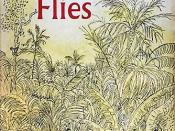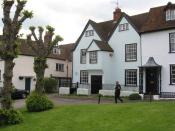Modern history has shown us the evil that exists in human begings.
Assassinations are commong, governments use torture to discourage dissent, and six million Jews were exterminated during World War II. In LORD OF THE FLIES, William Golding describes a group of schoolboys shipwrecked onan island with no authorty figures to contro ltheir behavior. One of the boys soon yields to dark forces within himself, and his corruption symbolizes the evil in all of us. First, Jack Merridew kills a living creature; then, he rebels against the group leader; and finally, he seizes power and sets up his own murderous society.
The first stage in Jack's downfall is his killing of a living creature. In Chapter 1, Jack aims at a pig but in unable to kill. His upraised arm pauses "because of the enormity of the knife descending and cutting into living flesh, because of the unbearable flood," and the pig escapes.
Three chapters later, however, Jack leads some boys on a successful hunt. He returns triumphantly with a freshly killed pig and reports excitedly to the others, "I cut the pig's throat." Yet Jack twitches as he says this, and he wipes his bloody hands on his shorts as if eager to remove the stains. There is still some civilization left in him.
After th initial act of killing the pig, Jack's refusal to cooperate with Ralph shows us that this civilized part is rapidly disappearing. With no adults around, Ralph has made some rules. One is that a signal fire must be kept burning. But Jack atempts the boys watching the fire to go hunting, and the fire to go hunting, and the fire goes out. Another rule is that at a meeting, only the person holding a special seashell has the right to speak. In Chapter 5, another boy is speaking when Jack rudely tells him to shut up. Ralph accuses Jack of breaking the rules. Jack shouts: "Bollocks to the rules! We're strong--- we hunt! If ther's a beast, we'll hunt it down! We'll close in and beat and beat and beat--!" he gives a "wild whoop" and leaps off the platform, throwing the meeting into choas. Jack is now much more savage than civlized.
Through Jack Merridew, Golding shows how easily moral laws can be forgotten.
Freed from grown-ups and their rules, Jack learns to kill living things, defy authority, and lead a tribe of murdering savanges. Jack's example is a frightening reminder of humanity's potential for evil. The "beast" the boys try to hunt and kill is actually within every human being.





